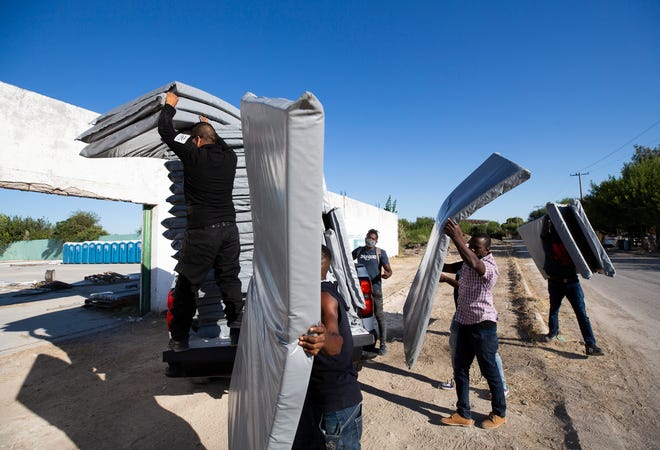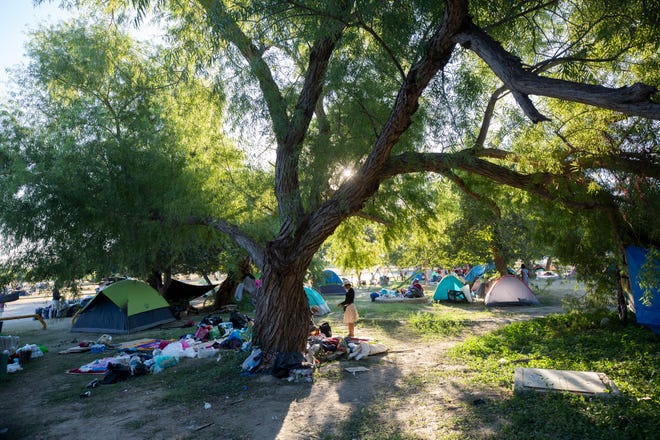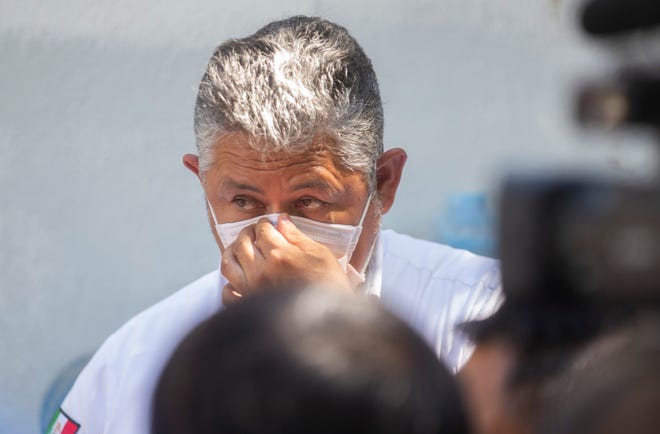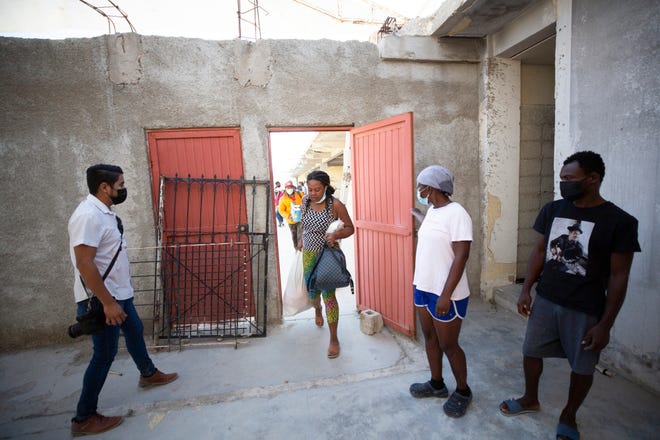CIUDAD ACUÑA, Coahuila — Acuña Deputy Mayor Felipe Basulto Corona made an offer to Haitian migrants huddled in a makeshift camp in a park near the Rio Grande.
"The Mexican government is going to offer the opportunity to those who want to stay in Mexico to proceed with the legal residency and work permit procedures here," he told them Friday, if they vacate the park and move to a rented private building in Acuña being used by Mexican immigration authorities.
"You will not be imprisoned, you will not be detained. You are free, you are home," Basulto Corona told them.
Eventually, about 50 Haitian migrants — men, women and children — at Braulio Fernández Aguirre Park agreed to move to the building.
So ended the weeklong, relentless campaign by U.S. and Mexican officials to resolve the Haitian migrant crisis, after about 15,000 migrants had amassed near Del Rio beginning in mid-September.

By Saturday morning, no migrants were left at the park, located only a few hundred feet south of the Rio Grande. It's unclear how many other migrants scattered throughout the Acuña area to seek refuge elsewhere.
More:From Haiti to Texas: How migrants arrived to Del Rio and why the wall didn't stop them
U.S. Customs and Border Protection planned to open the Del Rio Port of Entry at 4 p.m. Sept. 25. Passenger and pedestrian traffic will be allowed. The commercial cargo operations are set to resume at 8 a.m. on Monday, Sept. 27. The port had been closed since Sept. 17.
On Friday, U.S. Homeland Security Secretary Alejandro Mayorkas said at a news briefing at the White House that the Haitian migrant camp under the Del Rio International Bridge was empty.
All week, U.S. officials had used buses to move thousands of Haitian migrants to processing centers or place them on expatriation flights to Haiti. Some weary Haitians decided to return to Mexico rather than risk being expelled from the U.S.

The Haitians, whose homeland is reeling from the July assassination of President Jovenel Moïse, an August earthquake and gang violence, hoped to seek asylum in the U.S. Many had left their country before the recent tumult, traveling first to South America, and then making their way north to the Texas-Mexico border.
President Joe Biden’s administration responded with a six-point plan that relied heavily on Title 42, a provision of federal law that permits health officials to ban people from entering the country during the COVID-19 pandemic, to immediately expel the migrants to their countries of origin.
Pleading to stay
Mexican authorities worked to stop Haitians from reaching the Del Rio camp by removing migrants from buses, city streets and hotels in Acuña. The park was the final haven for large groups of Haitians fearful of the Mexican sweeps.
But at noon Friday, Basulto Corona told the Haitians at the park that they would be taken to a "designated area," where they would have a roof over their heads, receive food and water and be able to apply for legal residency in Mexico and work permits.
More from Del Rio:El Paso Times journalists' video shows confrontations between Border Patrol agents, Haitian migrants
The migrants had pleaded with Mexican immigration officials this week to be able to file the paperwork in the border city. They did not want to be sent back to Tapachula, Chiapas, near Mexico’s southern border, where they say there are no jobs.

Skeptical Haitian migrants asked Basulto Corona to ensure them that they would not be sent back to Tapachula or expelled to Haiti. "Is this true?" several migrants shouted. "We're not getting on a bus to get there, we'll walk there. We'll walk."
The offer from Mexican immigration officials came after a week of fear and uncertainty and a day after Mexican State Police at dawn entered the park, lining up their vehicles along the banks of the Rio Grande. Mexican officials shut off the park's power and had told the Haitian migrants they would not be allowed to stay in the border town and their only option was to go back to the southern border with Guatemala.
More:Want to donate or volunteer to assist Haitian refugees? Here's how to help
'We're fearful'
After hours of discussion, some Haitian migrants were persuaded by local religious leaders and elected officials to move to the building being used by immigration authorities, which would be "safer than being exposed to danger at the park," Basulto Corona said.
Small groups of migrants were taken on pickup trucks to the building where they'd be staying: a private events center, called Fandango. The space has a concrete-floor outdoor space and no air conditioning. The location was still under construction with tools and construction equipment left unattended, and it's unknown if there is running water.
Historians:Border Patrol agent's treatment of Haitian migrants recalls slavery-era whippings
Ilfrid Alcide, 26, debated whether or not to move his family to the building. No one could guarantee him that he and his family would not be expelled from the city once they moved from the park, he said.
"We don't know what could happen," Alcide said. "Now we're here but we're fearful about what could happen next. But now we can only hope, with God's grace, that it will be OK."

Some Acuña residents who have been helping migrants throughout the week, delivering food, water and clothing to them, accompanied them to the building to make sure they would be safe.
"Why did they take so long to do this?" said Jose Luis Reyes of Acuña, who once attempted to migrate to the United States himself and said he can relate to the Haitian migrants' struggle.
"I just hope that (Mexican authorities) are telling these people the truth,” Luis Reyes said. “That they'll keep them here safe and that they won't try to send them back."
Some migrant Haitians on Friday said they were feeling exhausted after an emotionally draining months-long journey to the U.S.-Mexico border.
More:Unlike Trump, Biden doesn't have an immigration czar. But does he need one?
For the past three weeks, Milo Cezaire, 29, said he had been staying at an apartment he rented. He was never at the park, he said.
But on Friday, on his way to a store, he was picked up by Mexican immigration authorities and dropped off at the building.
But Cezaire said he had given up. He's done running, he said.
On Friday, he picked a spot and placed a cot in a corner of the building, where he'll wait to continue the process to obtain residency in Mexico and a work permit.
"I'm not scared anymore. Whatever happens, happens," Cezaire said. "My life is now in God's hands."
Austin American-Statesman reporter Natalia Contreras can be reached at 512-626-4036 or [email protected]. Follow her on Twitter and Facebook, @NataliaECG.
Source link










